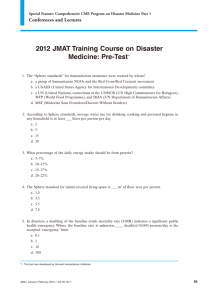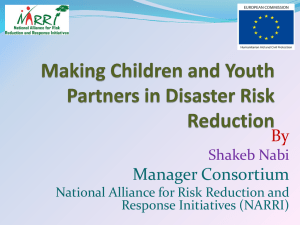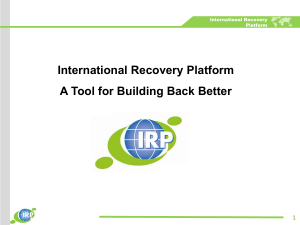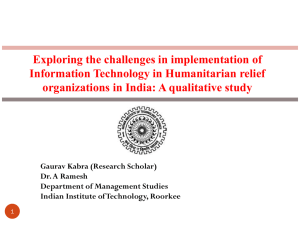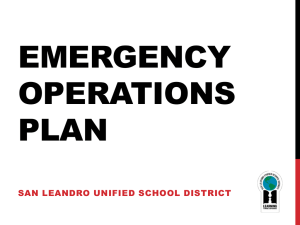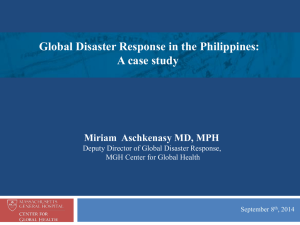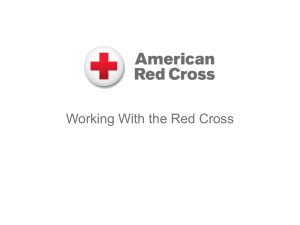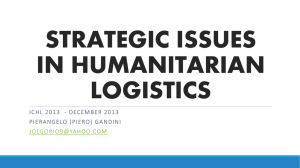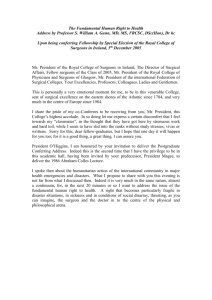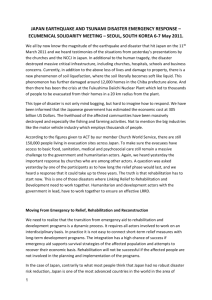Scope of Starting a Course on Humanitarian Logistics in
advertisement
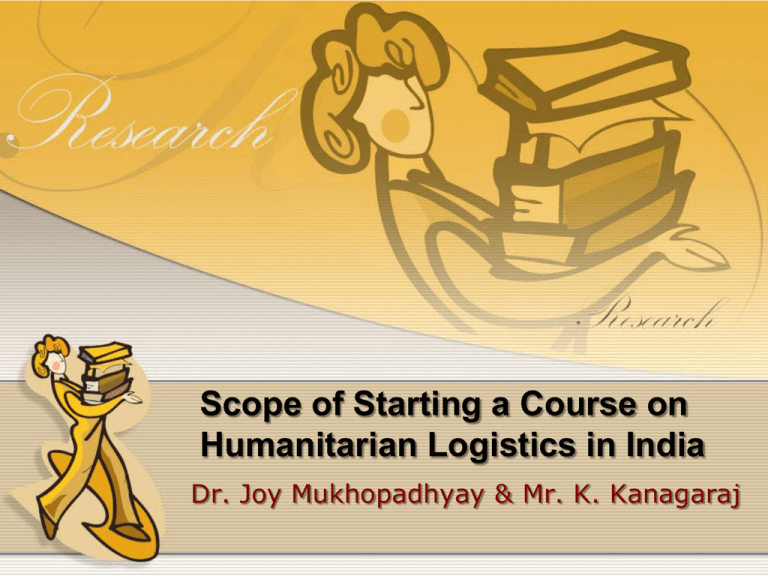
Scope of Starting a Course on Humanitarian Logistics in India Dr. Joy Mukhopadhyay & Mr. K. Kanagaraj DISASTERS IN INDIA RESEARCH OBJECTIVES • Explore educational courses in Disaster Management and Humanitarian Logistics abroad. • Explore educational courses in Disaster Management and Humanitarian Logistics in India. RESEARCH METHODOLOGY • This research is exploratory in nature and this paper is a conceptual paper. • The research is based basically on secondary data. Secondary data was collected from media reports. • There are sufficient media reports since it created a sensation when it was introduced first in USA. • Since then there are other institutions in other countries which introduced similar courses and by now there are a few relevant courses in India. • Primary data was collected in the form of expert opinions. No statistical analysis was attempted. Suitable recommendations were made at the end. SWOT ANALYSIS From Academicians’ point of view Strength: • There will be a pool of people who can be considered qualified experts in this field of study. • A knowledge bank can be created which can be further integrated with technology and making a effective DSS during an emergency. Will cater to needs of the society in terms of disaster readiness. Weakness: • Very few takers of this course unless it is sponsored by Government/NGO • The curriculum can be designed on a general basis on a specific disaster basis. • The practical aspects can be understood on in times of calamities artificially calamities cannot be created on that scale. Contd… Opportunities: • At an international level coordination with other organizations like Red Cross will help us is increasing our knowhow of humanitarian logistics. • Disaster readiness and effective evacuation methods can be introduced at school level education so that they aware of the basics of the same. Workshops can be conducted for the general public for effective evacuation procedures. • • • Threats: No takers of this course on a regular basis. Lack of employment opportunities. May not attract the best talent. Contd… From Administrators’ point of view Strength: • Disaster management becomes professionally managed by experts who are trained and equipped with the necessary knowledge. • Access to local & global knowledge bank regarding disaster management. Weakness: • Not sure of continuous employment. • Where else these resources (people) can be utilized after the disaster. • Practical training will be a challenge. Contd… • • • Opportunities: Minimization of casualties. Quick response time. Effective recovery can be planned from the damages caused by the disaster. Threats: • Very few people may take this as career. • Both the Academicians and Administrators agreed on two specific points. • They are not sure whether there are enough employment opportunities on a regular basis for people finishing the course. • What will be the practical content of the course? CONCLUSION & RECOMMENDATIONS Conclusion: • We do not have a professional course for Humanitarian Logistics; it is usually done only as a small part of Disaster Management studies where as it forms the major activity during a disaster. Recommendations: • Premier institutes like IIM must start a specialized course on Humanitarian Logistics where in Administrators like IAS officials and Defense officials can trained and equipped with the necessary knowledge to manage crisis. • There should be special training programme for the local population at the disaster prone areas at the panchayat level so that they can contribute during emergencies. • Disaster management basics should be introduced at the school level education. TRANSFORMATION
